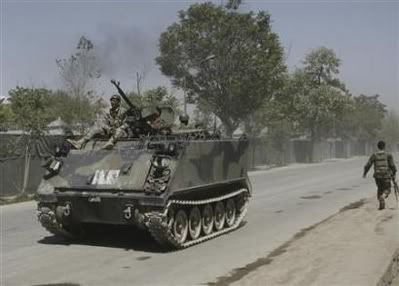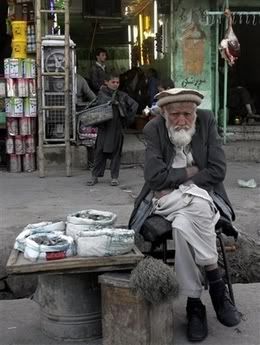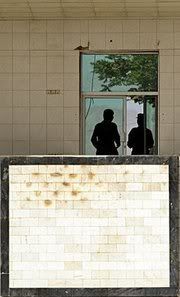Several different perspectives on the reality of being in Kabul, Afghanistan

here's one (see extended excerpt below)...
"For foreigners in Kabul, the fact they can jump in cars and drive around, take walks in the evening and go out to restaurants..."
we-e-e-e-llll, not exactly... because the project i work with is under usaid, we have some fairly strict security rules, laid down by usaid and enforced by the security company employed by the project... as much as i would love to walk around, i am under orders to fughedaboudit, and the number of restaurants i am allowed to patronize hovers between 4 and 6 depending on the security situation of the moment... we can visit the atm of the afghanistan international bank, make occasional runs to a few approved grocery stores, and i can pretty much go to and from business meetings as needed...
almost all trips outside the guarded, walled, cctv'd compound take place in a 3.5 ton, armored, toyota landcruiser with a project driver... last saturday night, going to and from a dinner attended by usaid and afghan dignitaries, the driver was joined by a "shooter," a rifle-equipped guard riding in the passenger seat... i've occasionally been driven around in one of the project's non-armored vehicles, aptly called "soft-skin transportation," and a few times one of the afghans i've been meeting with was kind enough to give me a lift back in his vehicle...

Tank rumbling down my street
Sunday, April 27
however, the article does capture fairly well the glory of the afghan spring... i've spent a number of hours over lunch breaks, in the evenings and on days off, basking in the sunshine, enjoying the cool breeze, gazing at the snow-covered peaks of the hindu kush mountain range to the northwest, and imagining just how truly wonderful it would be if the country could find peace and get on with exploring its real potential...
While President Hamid Karzai may have narrowly escaped an assassination attempt in central Kabul on Sunday, in many ways the Afghan capital is remarkably calm and orderly for a city in the midst of war.
With the winter past and spring sunshine bathing the surrounding mountains and tree-lined streets, one could be forgiven for thinking a healthy ceasefire was in force if it were not for the checkpoints, very occasional gunfire, and heavy security surrounding government buildings and embassies.
Sunday's dramatic attack by a group of Taliban militants on a military parade, killing three and alarming Karzai and invited foreign dignitaries, was a powerful reminder of the deadly threat insurgents can land in the heart of Kabul.
But by comparison with Baghdad, that other capital at the centre of a war zone where U.S. and British forces are trying to quell an insurgency, Kabul feels far more stable and at ease considering the years of conflict it has suffered.
For foreigners in Kabul, the fact they can jump in cars and drive around, take walks in the evening and go out to restaurants -- even though a five-star hotel was hit by a suicide attack in January -- immediately sets it apart from Baghdad.
In Iraq, the threat of kidnapping or car bombings -- which also occur in Kabul -- makes venturing outside a potentially lethal exercise that most avoid except under the most pressing of circumstances.
Baghdad has become a city of concrete, with 14-foot (four meter) anti-blast walls surrounding many buildings, offices and ministries, blocking off whole streets or districts, and turning even straight-forward journeys into confusing mazes.
It is not uncommon to see heavily armed U.S. troops, backed by armored vehicles and low-flying helicopters, carrying out raids in central Baghdad, fingers nervously on triggers.
By contrast in Kabul, Afghan security forces are the major presence on the streets, politely manning checkpoints, running night-time checks on drivers and even enforcing traffic regulations, although many locals still ignore them.
"Having lived in both Kabul and Baghdad, I can say with certainty that it's very, very different," said a British diplomat, explaining how it would be inconceivable to drive oneself around Baghdad or meet an Iraqi contact at a restaurant, both of which are eminently doable in Kabul.
"People here live in a very normal way. They have dinner parties, they drive or walk around. You can live without excessive levels or security, without a small army having to protect you, as is the case in Baghdad."
look, ma...! it's a STOPLIGHT...!
A surprising recent development on a busy junction in one well-off district of central Kabul has been the installation of a traffic light. As far as long-term residents of the city know, it is the first to be installed in the past six years.
At first no one paid any attention to it. But with a little strict monitoring by whistle-blowing traffic police, the light is now enjoying some success, to the amusement of Kabulis.
The light even has an electronic display telling drivers how long they have to wait until it turns green again, and pedestrians how long they have to cross the road before the onslaught of traffic resumes. For the record, it's 53 seconds.
In Baghdad, the traffic lights that do exist have long since fallen into disrepair or been shot to bits. One resident of the city says her eight-year-old son learned about traffic lights in kindergarten, "and has always dreamed since of seeing one."
i was coming back from a meeting a couple of weeks ago and was surprised to find i was waiting for a stoplight to change... when it turned green, the woman driving the car ahead of us just sat there, obviously not used to paying attention to an electronic signal... the horns started to blow and she finally snapped to attention and got on her way...
note: when the writer says "'well-off' district of central kabul," 'well-off' is a relative term... the light happens to be at a major intersection of streets lined with small shops, only a few of which come even close to sporting an exterior that might entice a westerner, used to the facades of western retail stores, to enter... the only truly 'well-off' places i've seen are what i'm told are "pakistan-style" mcmansions springing up in wazir akbar khan*, a district of the city where the profiteers, the ministers and officials on the take, and the international pooh-bahs hang out...
[* In early September 2003, Karzai's chief of police in Kabul led officers in bulldozing away homes that some thirty poor Afghan families had built for themselves on open land in the posh Wazir Akbar Khan area, to make way for houses for high-ranking Karzai officials.]

Not so 'well-off' street vendor
Central district, Kabul
here's another perspective...
U.S. Marines in helicopters and Humvees flooded into a Taliban-held town in southern Afghanistan's most violent province early Tuesday, the first major American operation in the region in years.
Several hundred Marines pushed into the town of Garmser in predawn light in an operation to drive out militants, stretching NATO's presence into an area littered with poppy fields and classified as Taliban territory.
Helmand province is the world's largest opium poppy growing region and has been a flashpoint of the increasingly violent insurgency the last two years. British troops — who are responsible for Helmand — have faced fierce battles on the north end of Helmand.
U.S. commanders say Taliban fighters had been expecting an assault and were setting up improvised explosive devices. It wasn't known how much resistance the Marines would face in Garmser, where the British have a small base at the town's edge but whose main marketplace is closed because of the Taliban threat.
and still another...

Soldiers of the Afghan National
Army (ANA) stand guard
Afghanistan's national army will take over the security of Kabul as scheduled this autumn despite a brazen attack by suspected Taliban militants at the heart of the Afghan capital, the special UN envoy to the insurgency-wracked nation said Monday.
"The ANA (Afghan National Army) takeover of Kabul is supposed to happen in autumn this year and I expect that to take place according to the schedule they have outlined," said envoy Kai Eide of Norway, who took over about a month ago.
The training of the national army, numbering more than 64,000 soldiers and scheduled to grow to 80,000 by the end of this year, was "not going badly at all" ahead of shouldering its new responsibility, he said.
The upcoming takeover "is an important step in the right direction," Eide said at a Washington forum when asked whether Sunday's attack at a top military parade in central Kabul -- seen also as an assassination attempt on Afghan President Hamid Karzai -- had cast doubt on the Afghans' role in assuming security responsibility.
it's all part of what's happening...
Labels: Afghan National Army, Afghanistan, Hamid Karzai, Kabul, NATO, Taliban, U.S. Marine Corps
Submit To PropellerTweet














